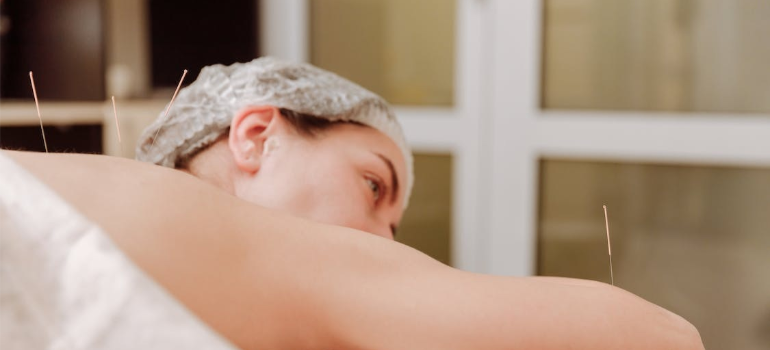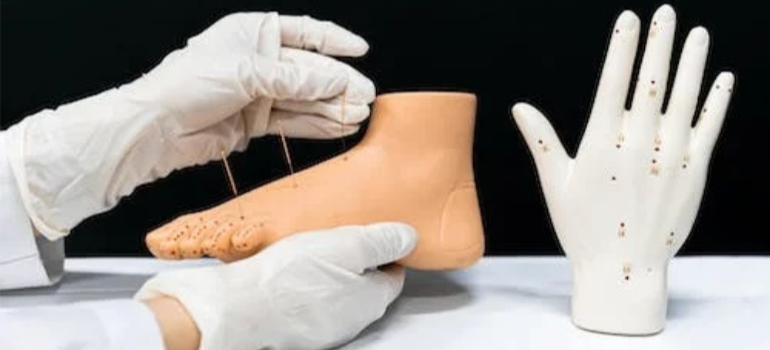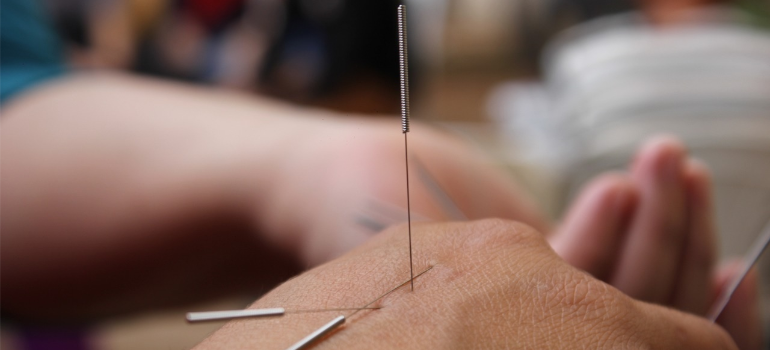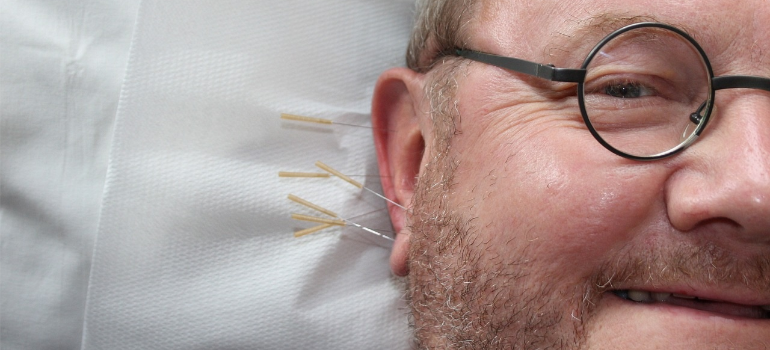Acupuncture, an established therapeutic method rooted in ancient Chinese medicine, has gained recognition as a potential complementary practice in drug addiction treatment. At Harmony Ridge Recovery Center, we embrace a holistic approach to recovery, acknowledging the diverse needs of individuals seeking comprehensive care. Recognizing the potential benefits of acupuncture in drug addiction treatment, we offer this traditional practice across our programs.
In the following post, we will delve into the potential benefits and considerations of acupuncture in the context of drug addiction treatment. We will explore its effects on withdrawal symptoms, its role in stress reduction and emotional well-being, and its place within a broader treatment framework. By shedding light on the effectiveness of acupuncture in addiction recovery, we aim to contribute to a deeper understanding of the potential benefits of this time-honored practice in the context of modern treatment approaches.
Definition, Principles, and Uses of Acupuncture
Acupuncture is a therapeutic practice rooted in traditional Chinese medicine that involves the insertion of fine needles into specific points of the body. It is based on the belief that the body has a network of channels or meridians through which vital energy, known as Qi, flows. By stimulating these points, acupuncture aims to restore balance and promote the body’s natural healing processes.

Acupuncture has been recognized by WHO since 1979 and has been widely utilized in various areas of healthcare:
- It is frequently employed to alleviate pain, ranging from chronic conditions like arthritis and migraines to acute injuries or postoperative discomfort.
- Acupuncture has shown promise in managing stress, anxiety, and depression by promoting relaxation and improving emotional well-being.
- In the realm of reproductive health, acupuncture has been utilized to support fertility treatments and alleviate symptoms associated with menstrual disorders.
- Acupuncture is also employed in the management of chemotherapy-induced nausea and vomiting, as well as for symptoms related to other chronic conditions such as fibromyalgia and irritable bowel syndrome.
- In more recent years, acupuncture has gained attention in the field of sports medicine for its potential to enhance athletic performance and facilitate injury recovery.
Given this versatility, recent years have also revealed uses for acupuncture in drug addiction treatment. While acupuncture is not a standalone solution for addiction, it can enhance a holistic approach to addiction treatment. It does so primarily by addressing withdrawal symptoms, reducing cravings, and enhancing overall well-being during the recovery journey.

Theory and Possible Mechanisms for the Effectiveness of Acupuncture in Drug Addiction Treatment
Indeed, acupuncture has shown promise as a potential treatment for drug addiction. Substance abuse treatment in WV frequently involves it as an optional therapeutic practice with ample demonstrable benefits.
Still, the exact nature of its mechanisms eludes researchers. Several theories and possible mechanisms explaining its effectiveness have emerged, including the following:
- Regulation of Neurotransmitters: Acupuncture may influence the release and balance of neurotransmitters such as dopamine, serotonin, and endorphins, which play a crucial role in reward pathways and mood regulation.
- Modulation of the Stress Response: Acupuncture has been found to reduce stress levels by activating the parasympathetic nervous system, promoting relaxation, and diminishing the heightened stress response often associated with addiction.
- Restoration of Homeostasis: By targeting specific acupuncture points, the therapy aims to restore the body’s balance and promote overall well-being, potentially addressing the imbalances caused by addiction.
- Reduction of Cravings: Acupuncture may help reduce drug cravings by stimulating the release of endorphins, which can induce a sense of calm and satisfaction, potentially diminishing the desire for substances.
- Enhancement of Detoxification: Acupuncture may support the body’s natural detoxification processes by improving blood circulation, enhancing lymphatic flow, and promoting the elimination of toxins.
- Psychological and Emotional Support: Acupuncture sessions provide individuals with a supportive and therapeutic environment, promoting relaxation, reducing anxiety and depression symptoms, and aiding in emotional well-being during the challenging recovery process.
While the precise mechanisms by which acupuncture in drug addiction treatment offers its benefits are still being investigated, these potential mechanisms highlight the multifaceted nature of acupuncture’s impact. By addressing both physical and psychological aspects of addiction, acupuncture offers a holistic approach that complements other treatment modalities and supports individuals on their path to recovery.

Role and Efficacy of Acupuncture in Comprehensive Treatment
With the above in mind, here we should explore two crucial fronts. These are the exact role of acupuncture in addiction treatment and its actual effectiveness.
The Role of Acupuncture in Rehabilitation
Starting with the former, acupuncture plays a significant role in comprehensive addiction treatment. It particularly does so within the realm of holistic care, extending beyond inpatient programs and continuing into outpatient settings. Our own rehab center in Huntington WV recommends it in this exact context, as well.
Acupuncture offers a non-pharmacological method to manage withdrawal symptoms, reduce cravings, promote emotional well-being, and support overall recovery. Its inclusion in treatment programs acknowledges the significance of a holistic approach that addresses the physical, mental, and emotional aspects of addiction. Furthermore, by recognizing the evidence-based effectiveness of acupuncture, treatment providers can offer a broader range of therapeutic options and empower individuals with more choices on their path to lasting recovery.
The Efficacy of Acupuncture in Drug Addiction Treatment
That said, you may still wonder if acupuncture has demonstrable, studied benefits. Such approaches may be gaining ground in mainstream treatment perspectives, but some skepticism remains.
If that applies to you, fear not. Multiple studies conducted by NCBI have consistently demonstrated the effectiveness of acupuncture as a treatment method for addiction.
- One study across different substances found that “acupoints can affect drug-induced physiological activities.”
- Another review of studies spanning 35 years did find that many studies were “classified as having low quality” but also concluded that high-quality ones did demonstrate the practice’s effectiveness.
- Finally, another study found that “acupuncture may reduce relapse to drug-seeking behavior by regulating neurotransmitters involved in drug craving modulation via somatosensory afferent mechanisms.” Also, its findings propose that “acupuncture may reduce drug craving by correcting both dysfunctions of the mesolimbic dopamine pathway.”
These findings underscore the importance of treatment providers paying attention to acupuncture as a viable option in their therapeutic approach. Through it, individuals receive a more well-rounded and integrative approach to addressing the complexities of addiction. This is the belief our own rehab center near Athens OH operates on, incorporating various approaches into comprehensive addiction treatment.

Therapeutic Combinations
Having outlined the above, we should once again stress that acupuncture in drug addiction treatment only presents a potent component. Comprehensive addiction treatment often combines acupuncture with various therapeutic methods to achieve optimal results, including:
- Motivational Interviewing: Treatment providers frequently employ motivational interviewing for substance abuse to enhance individuals’ motivation and commitment to change. This collaborative approach helps explore and resolve ambivalence, strengthen motivation, and set goals aligned with recovery.
- Cognitive-Behavioral Therapy (CBT): CBT is a widely used therapeutic approach that focuses on identifying and modifying unhealthy thought patterns and behaviors. By addressing underlying beliefs and triggers, CBT helps individuals develop coping strategies, manage cravings, and adopt healthier habits.
- Family Therapy: Involving family members in the treatment process can be invaluable. Family therapy for addiction helps improve communication, rebuild relationships, and foster support systems that contribute to long-term recovery. It educates families about addiction, addresses family dynamics, and promotes healthy coping mechanisms.
- Mindfulness-Based Practices: Mindfulness techniques, such as meditation, deep breathing exercises, and body awareness, promote present-moment awareness and reduce stress. These practices help individuals cultivate self-compassion, manage cravings, and enhance overall emotional well-being.
- Group Therapy: Group therapy provides a supportive environment for individuals to share experiences, gain insights, and receive feedback from peers and trained therapists. It fosters a sense of community, reduces isolation, and promotes accountability.
- Individual Counseling: Individual counseling sessions offer personalized attention and guidance tailored to each individual’s needs. Therapists work with clients to explore underlying issues, develop coping strategies, and address specific challenges on their recovery journey.
By combining acupuncture with these therapeutic methods, comprehensive addiction treatment addresses the physical, emotional, psychological, and social aspects of addiction, providing individuals with a well-rounded approach that supports their long-term recovery.

Effects of Acupuncture on Drug Dependence
Of course, acupuncture in drug addiction treatment sees increasing appeal because of its effects on drug dependence. Studies have shown that acupuncture can contribute to reducing drug dependence through various mechanisms:
- Firstly, acupuncture has been found to alleviate withdrawal symptoms associated with drug cessation, including anxiety, insomnia, nausea, and body aches. By targeting specific acupuncture points, the therapy may help regulate neurotransmitters and promote the release of endorphins, thereby reducing discomfort during the withdrawal process.
- Secondly, acupuncture has been shown to reduce drug cravings, potentially enhancing individuals’ ability to resist relapse. The stimulation of acupuncture points may influence the reward pathways in the brain, modulating dopamine release and diminishing the intense desire for drugs.
- Moreover, acupuncture can have a calming and stress-reducing effect, aiding in managing the emotional and psychological aspects of drug dependence. By promoting relaxation and emotional well-being, acupuncture may contribute to reducing stress and anxiety, which are common triggers for drug use.
Further research is indeed needed to fully understand the mechanisms underlying the effects of acupuncture on drug dependence. However, its potential to mitigate withdrawal symptoms, reduce cravings, and support emotional well-being highlights its value as an adjunctive therapy among other addiction therapy options.

Effects of Acupuncture on Psychological Symptoms
More demonstrably yet, acupuncture has shown promising effects on psychological symptoms related to drug dependence. It is this fact that makes it a complementary approach to address the emotional and mental aspects of addiction.
As we outlined above, research suggests that acupuncture can have a positive impact on anxiety, depression, and stress. Individuals with drug dependence commonly experience such symptoms, so the benefit of acupuncture in drug addiction treatment bears significance. By stimulating specific acupuncture points, the therapy may activate the parasympathetic nervous system, promoting relaxation and reducing the body’s stress response. This can also help individuals better cope with the emotional challenges of addiction recovery.
Additionally, acupuncture can enhance mood and improve overall emotional well-being. The release of endorphins and the modulation of neurotransmitters, such as serotonin and dopamine, through acupuncture, may contribute to a more stable and positive emotional state.
Furthermore, acupuncture sessions offer a therapeutic environment where individuals can express and process their emotions, providing a supportive space for psychological healing. By addressing psychological symptoms associated with drug dependence, acupuncture can play a valuable role in comprehensive addiction treatment, promoting emotional stability and supporting individuals in their journey toward recovery. Our own rehab center near Cambridge OH has observed this benefit manifold, which is why we leverage acupuncture throughout our programs.
Potential Risks and Precautions with Regard to Acupuncture in Drug Addiction Treatment
Finally, before concluding, here we should briefly outline potential risks and precautions associated with this practice.
Acupuncture is by no means dangerous, but like all therapeutic practices, it can entail risks if employed haphazardly. As such, the following should convince you of the importance of receiving acupuncture from licensed, trained, and experienced professionals.
#1 Bleeding or Bruising
Occasionally, acupuncture may cause minor bleeding or bruising at the insertion sites. Acupuncture in drug addiction treatment can also cause psychological reactions in such cases, so this risk bears noting. This risk can be minimized by using sterile needles, avoiding areas with fragile skin, and ensuring the acupuncturist has proper training and experience.

#2 Infection
If acupuncture needles are improperly sterilized or reused, there is a risk of infection. To minimize this risk, it is important to seek acupuncture treatment from licensed and qualified practitioners who follow proper hygiene and sterilization protocols.
#3 Interactions with Medications
Acupuncture may have potential interactions with certain medications. It is crucial to inform your acupuncturist about any medications or supplements you are taking to minimize the risk of adverse reactions or interactions.
#4 Psychological Impact
Acupuncture treatment can sometimes bring up emotional or psychological responses, which may be challenging for individuals struggling with drug addiction. It is important to have a supportive environment and to communicate any discomfort or emotional distress to your acupuncturist.
#5 False Sense of Security
Lastly, acupuncture should be a complementary therapy and not a standalone treatment for drug addiction. Relying solely on acupuncture without addressing the underlying causes and seeking appropriate addiction treatment may lead to a false sense of security and hinder overall recovery.

Harmony Ridge Recovery Is Here for You
The effectiveness of acupuncture in drug addiction treatment should not remain unnoticed. Research and clinical studies have demonstrated its potential benefits in managing withdrawal symptoms, reducing cravings, and addressing psychological aspects of addiction. At Harmony Ridge Recovery, we embrace acupuncture as part of a holistic approach to recovery and combine it with other therapeutic methods so individuals receive a well-rounded treatment experience that addresses their physical, emotional, and psychological needs.
If you or your loved ones are exploring holistic addiction treatment options, please feel free to contact us today. Our teams are always available and will happily assist you in any way you need.



